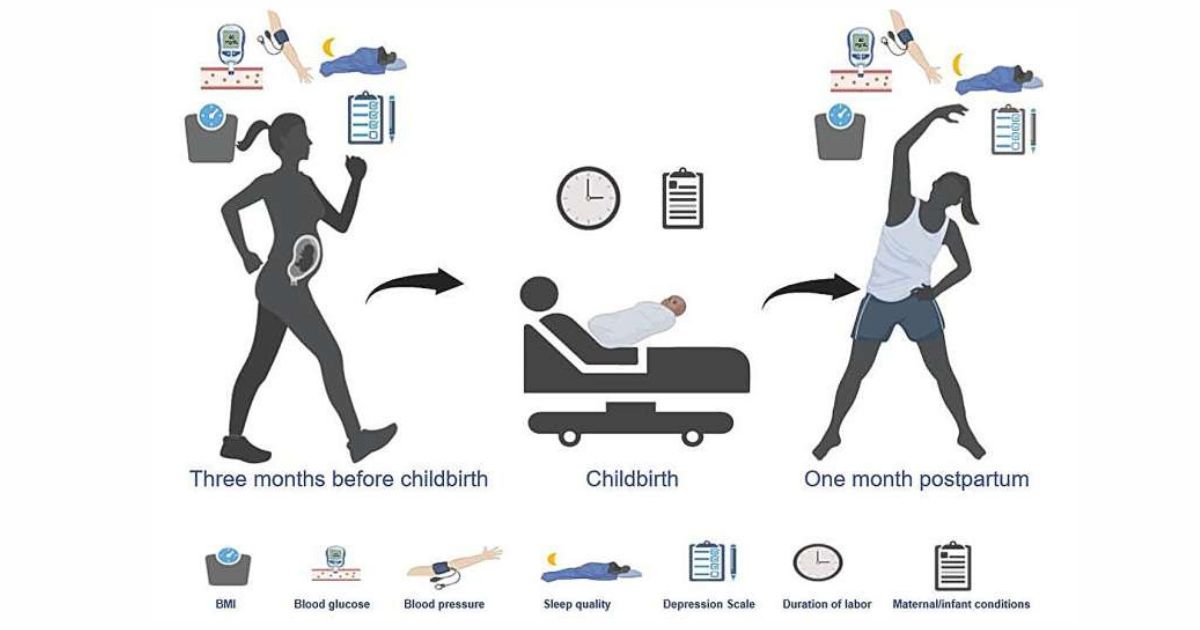In a groundbreaking revelation, a team of physical education researchers from China University of Geosciences has unearthed a potential antidote to postpartum depression – moderate, regular exercise. Through a meticulous meta-analysis of 26 prior studies, published in the open-access journal PLOS ONE, the researchers shed light on the profound impact of moderate exercise on alleviating symptoms of postpartum depression in some women.
Postpartum depression, a prevalent mood disorder affecting women after childbirth, has long been a topic of concern. Past studies have suggested that a substantial percentage of women, ranging from 50% to 75%, experience varying degrees of depressive symptoms after giving birth, with 10% to 15% encountering symptoms severe enough to warrant a diagnosis of postpartum depression.
Postpartum Depression and Moderate Exercise Link
The disorder extends beyond depression, often manifesting as anxiety, sleep disturbances, and extreme mood swings.
While traditional therapies have been developed to tackle these symptoms, they often come with undesirable side effects. In the pursuit of alternative, drug-free approaches, researchers have turned their attention to exercise as a potential solution. However, until now, a comprehensive understanding of the most effective types of exercise and the optimal duration has been lacking.
The Chinese research team aimed to fill this knowledge gap by conducting an extensive analysis of 26 studies, focusing on the impact of aerobic exercise on postpartum depression. Their findings bring clarity to the efficacy of exercise in mitigating postpartum depression symptoms.
The researchers discovered that engaging in aerobic exercise exhibited positive effects for most women grappling with postpartum depression. Notably, activities such as jogging, walking, and swimming showcased beneficial outcomes.
These exercises, which elevate heart rate, enhance blood flow, and crucially increase neurotransmitter levels in the brain, proved instrumental in combating the multifaceted symptoms of postpartum depression.
Delving deeper, the team identified that exercising in group settings proved more effective in reducing symptoms compared to solitary exercise. This revelation suggests that the social and supportive aspect of group exercise contributes significantly to its positive impact on mental well-being.
In defining the optimal exercise regimen, the researchers pinpointed that moderate exercise lasting between 35 and 45 minutes, undertaken three to four times a week, yielded the most significant benefits.
This nuanced approach to exercise frequency and duration provides valuable guidance for women seeking a holistic strategy to manage postpartum depression.
While the study underscores the potential of exercise as a non-pharmacological intervention, the researchers acknowledge that further exploration is needed to identify the specific types of exercise that offer the utmost benefits. Despite this gap, the findings advocate for the incorporation of moderate, regular exercise into postpartum care strategies.
As we celebrate this breakthrough in the realm of women’s health, it is essential to recognize the broader implications of these findings. The prospect of harnessing the power of exercise, a readily accessible and natural intervention, offers new hope for women navigating the complex landscape of postpartum depression.
In a world grappling with mental health challenges, this research provides a ray of optimism, pointing towards a future where exercise becomes an integral component of postpartum care.
As women embark on their journeys through motherhood, the potential of exercise as a supportive ally against postpartum depression brings a refreshing perspective to holistic well-being.








Leave a Reply
You must be logged in to post a comment.